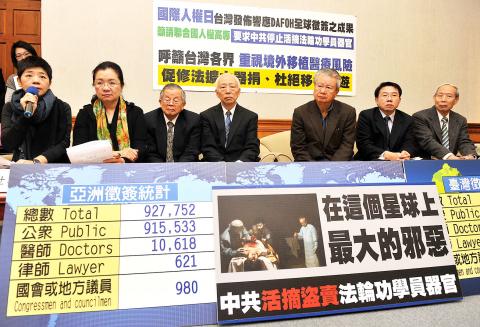|
Forced organ
harvesting highlighted
‘ORGAN SUPERMARKET’: Lawmakers and activists
urged Taiwanese to stop going to China for transplants, saying many of the
organs come from prisoners of conscience
By Alison Hsiao / Staff reporter

Legislators, government officials
and representatives of civic groups mark International Human Rights Day in
Taipei yesterday by displaying a breakdown of the number of people who have
signed a petition condemning China’s alleged organ harvesting from Falun Gong
followers.
Photo: Chien Jung-fong, Taipei Times
A petition initiated by Doctors Against
Forced Organ Harvesting to stop the practice in China has garnered more than
230,000 signatures in Taiwan, lawmakers and activists said on Human Rights Day
yesterday.
The appeal to the UN Human Rights High Commissioner was started in the middle of
June and calls for an “immediate end of forced organ harvesting from Falun Gong
practitioners in China.”
As of the end of last month, nearly 1.5 million people around the world have
signed the petition, including about 1 million from Asia.
Democratic Progressive Party (DPP) Legislator You Mei-nu (尤美女) said that Taiwan
is a nation governed by human rights principles and Taiwanese, who are
guaranteed the right to health, should not “build their wellbeing on somebody
else’s sorrow or pain.”
“China has been the main destination of Taiwanese needing organ transplants.
However, we have to be aware that a lot of the organs used for transplants in
China are sourced from prisoners of conscience and imprisoned Falun Gong
practitioners... The public has the right to know and the transparency of
relevant information should be enforced by our government,” she said.
DPP Legislator Tien Chiu-chin (田秋堇) said Taiwanese are blessed today because
they enjoy the product of their predecessors’ struggle for freedom from fear and
for free speech.
“They are like the air. People don’t sense their presence until they are taken
away, ” she said.
“I’ve personally seen a Falun Gong practitioner calling a hospital in China and
getting the response that a patient in need can undertake the matching process
needed for an organ transplantation any time,” she added. “It makes people
suspect that there exists an organization that operates like an organ
supermarket.”
International Care Association of Organ Transplants chairman Hu Nai-wen (胡乃文)
said the Chinese government has failed to explain the discrepancy between the
number of organ transplants performed in China and the number of executed
prisoners, which it identified as the source of the organs.
Tien said she had proposed, unsuccessfully, to deny National Health Insurance
coverage for anti-rejection medications to those who did not fill out a form
stating the name of the hospital and the surgeon who performed the organ
transplant.
“People are asked to fill out the form for the coverage, but there is no
punishment if you fail to comply,” Tien said.
Responding to the lawmakers’ and groups’ concerns, Ministry of Health and
Welfare’s Department of Medical Affairs Director Lee Wei-chiang (李偉強) said the
government does not encourage overseas organ transplantations due to the medical
risk and questions about the source of the organs.
“The number of Taiwanese who went to China for organ transplants has been
decreasing over the years. And there is a consensus that organs donated by
prisoners should not be accepted,” Lee said.
He added that the ministry has proposed an amendment to the Human Organ
Transplant Act (人體器官移植條例), which would make organ trafficking a crime subject to
one to five years in prison.
|
![]()
![]()
![]()